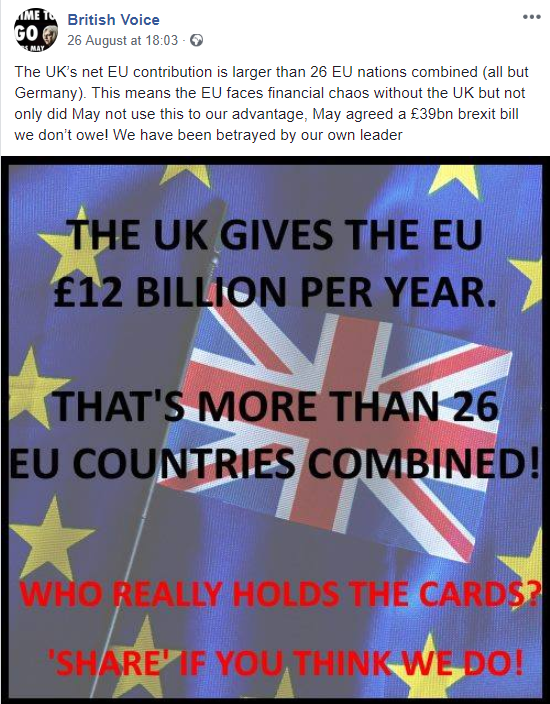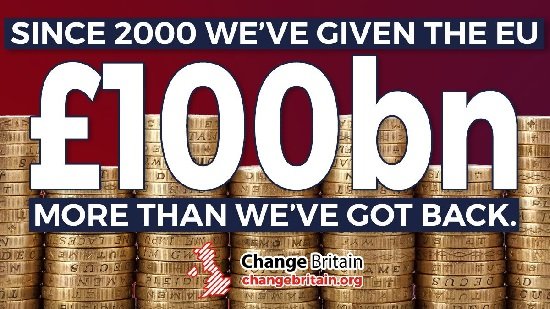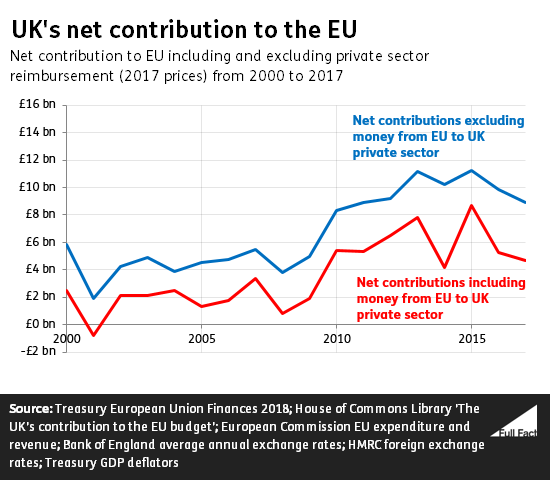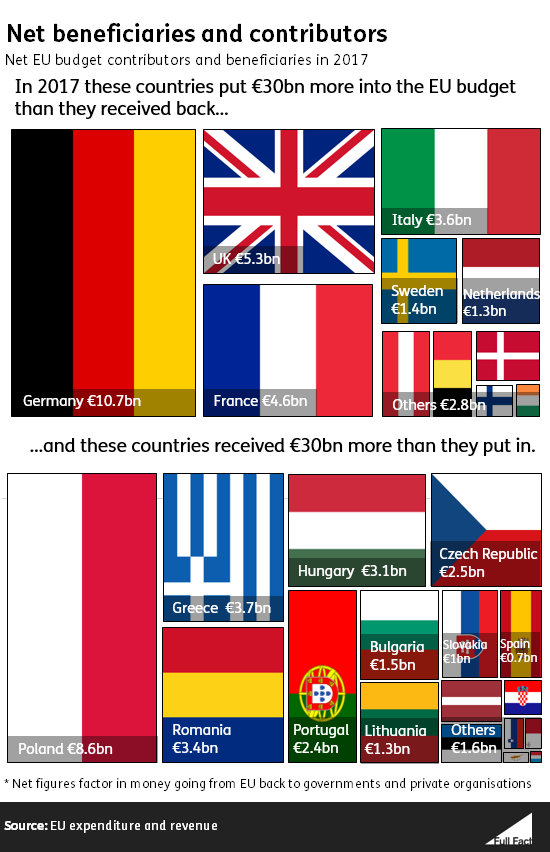What was claimed
Since 2000 we’ve given the EU £100 billion more than we’ve got back.
Our verdict
Broadly correct. Since 2000 the UK has made a net contribution in cash terms of £109 billion. That’s £122 billion in real terms.
What was claimed
Since 2000 we’ve given the EU £100 billion more than we’ve got back.
Our verdict
Broadly correct. Since 2000 the UK has made a net contribution in cash terms of £109 billion. That’s £122 billion in real terms.
What was claimed
The UK gives the EU £12 billion per year.
Our verdict
Incorrect. Last year the UK made a net contribution of up to £9 billion (not counting any money that goes to the UK private sector).
What was claimed
The UK’s net EU contribution is larger than 26 EU nations combined (all but Germany).
Our verdict
Technically correct, but this statistic is meaningless. In 2017 the UK’s net contribution to the EU was 18% of all net contributors.
What was claimed
Theresa May has agreed a £39 billion Brexit bill with the EU.
Our verdict
The UK government has agreed to a Brexit bill in principle, though an exact amount hasn’t been confirmed. The latest estimates suggest it will be around £35-39 billion.
“The UK’s net EU contribution is larger than 26 EU nations combined (all but Germany).”
British Voice, 26 August 2018
“Since 2000 we’ve given the EU £100bn more than we’ve got back.”
Change Britain, 27 August 2018
“The UK gives the EU £12 billion per year.”
British Voice, 26 August 2018


The UK is a net contributor to the EU budget, meaning it contributes more than it gets back.
From 2000 to 2017 the UK government made a net contribution of around £122 billion to the EU in real terms or around £109 billion in cash terms (though this doesn’t factor in money that goes back to the UK private sector).
The figure of £12 billion however is incorrect. Last year our contribution was £9 billion.
While it’s technically correct that the UK’s net contribution exceeded the net contributions of 26 other EU countries put together, that figure is meaningless because many countries are net beneficiaries.
Looking at the net contributors, the UK’s contribution made up about 18% of all positive contributions to the EU budget.
Join 72,547 people who trust us to check the facts
Subscribe to get weekly updates on politics, immigration, health and more.
Between 2000 and 2017 the UK gave the EU around £122 billion more than it received in return, once you factor in inflation. If you don’t factor in inflation it amounts to around £109 billion over the 17 years.
This is calculated by looking at the money the UK pays into the EU budget, including the rebate or discount that we get on that payment, and subtracting the money that comes back to the UK public sector again from the EU.
It doesn’t include money that the EU pays directly to the UK private sector.
If you factor that in, Britain’s given the EU £65 billion in 2017 prices. Some of the money the UK contributes to the EU budget also goes towards our spending targets, for example on overseas aid.

We’ve written more about the UK’s EU membership fee here and looked at what will happen after Brexit here.
It’s incorrect that the UK gives the EU a net contribution of £12 billion a year. Last year it was £9 billion (not counting any money going from the EU to the UK private sector).
The highest the net contribution has ever been was around £11 billion which was in 2013 and 2015, once you account for inflation.
As part of the Brexit negotiations the EU and Britain have agreed that Britain will pay a “divorce bill” to cover the UK’s contributions to the EU budget up to 2020 and outstanding commitments and liabilities.
The bill is estimated to be £35-39 billion, although the final value may change. You can read more about the divorce bill here.
It’s technically correct that the UK makes a bigger net contribution to the EU than all other countries (except Germany) put together, but that statistic doesn’t actually mean very much.
Countries in the EU can be either net contributors or net beneficiaries. Richer countries are typically contributors and poorer countries are typically beneficiaries. If you add up all the money EU countries contribute, and money they receive (including money that goes to the private sector), you break even.

Adding up the contributions of all the other countries means including net beneficiaries, which subtract from rather than adding to the combined total. Because of that, it’s true to say for any net contributor that they ‘contribute more than the other countries combined’. It’s as true for Ireland (net contribution—€173m) as it is for the UK or Germany.
Or to put it another way: it’s true the UK contributes more than the next 26 countries combined, but it’s also true that it contributes less than the next two countries (France and Italy) combined.
To work out how important the UK is to the EU budget, you need to look only at the countries that give more to the budget than they receive back.
In 2017, 11 of the 28 countries in the EU made a net contribution to the budget. The UK was the second biggest contributor giving €5 billion, or 18% of all EU net contributions. Germany contributed €11 billion (36%) and the other contributors gave €14 billion (46%).
Correction 30 October 2018
This article originally attributed the claim that the UK gives £12 billion a year to the EU to Change Britain, not British Voice.
Full Fact fights for good, reliable information in the media, online, and in politics.
Bad information ruins lives. It promotes hate, damages people’s health, and hurts democracy. You deserve better.